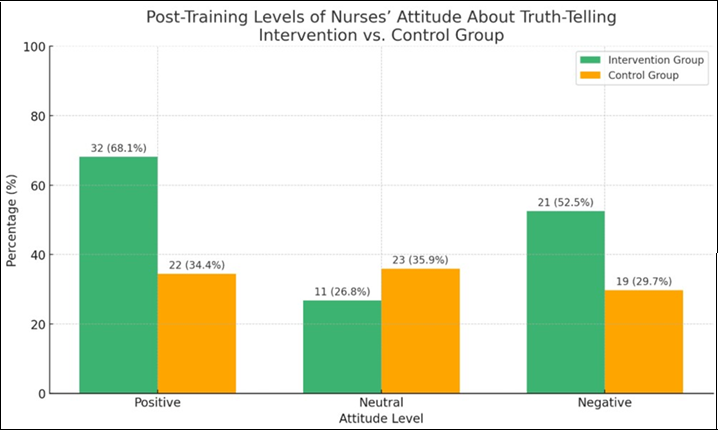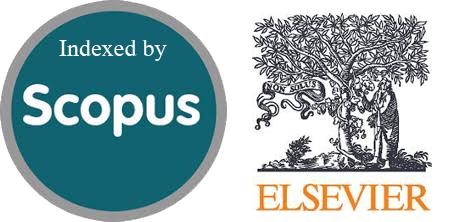Effectiveness of an Educational Program on Hospital Nurses’ Attitudes and Barriers Regarding Truth-Telling to Terminally Ill Patients in Erbil City
DOI:
https://doi.org/10.54133/ajms.v9i2.2365الكلمات المفتاحية:
Breaking bad news، Palliative care، Terminal illness، Truth-tellingالملخص
Background: Truth-telling to patients who are near death is a debatable and challenging topic in medical ethics. Providing patients with accurate information about their condition, especially when the news is unfavorable, such as a terminal diagnosis or a poor prognosis, is known as “truth-telling” in healthcare. Objective: to assess the effectiveness of an educational program on hospital nurses' attitudes toward truth-telling with terminally ill patients in Erbil City. Methods: A quasi-experimental study was conducted at four teaching hospitals in Erbil City. A non-probability (convenience) sample of 128 hospital nurses was selected, comprising 64 nurses in the intervention group and 64 nurses in the control group. Both groups completed a pretest, and only the intervention group received the educational program. For both groups, the post-test was given one month after the educational program. Results: There was a highly significant difference regarding hospital nurses’ attitudes toward truth-telling to terminally ill patients between the period before and after applying the educational program. In the intervention group, the majority of participants (73.2%) had neutral attitudes at the pre-test. After application of the educational program, most nurses (68.1%) expressed a positive attitude at the post-test. Common barriers among nurses include patients feeling hopeless and families requesting. Only a significant association was detected between nurses' attitudes and their gender. Conclusions: The study concluded that implementing the educational program resulted in an improvement in nurses' attitudes toward truth-telling with terminally ill patients.
التنزيلات
المراجع
Testoni I, Wieser MA, Kapelis D, Pompele S, Bonaventura M, Crupi R. Lack of truth-telling in palliative care and its effects among nurses and nursing students. Behav Sci (Basel). 2020;10(5):88. doi: 10.3390/bs10050088. DOI: https://doi.org/10.3390/bs10050088
Ayane GN, Kadimo K. Truth-telling about terminal illness prognosis in the African context: a review. J Communcat Healthcare. 2020;13(4):335-343. doi: 10.1080/17538068.2020.1809970. DOI: https://doi.org/10.1080/17538068.2020.1809970
Cordeiro FR, Griebeler Oliveira S, Zeppini Giudice J, Pellegrini Fernandes V, Timm Oliveira A. Definitions for “palliative care”, “end-of-life” and “terminally ill” in oncology: a scoping review. Enfermería: Cuidados Humanizados. 2020;9(2):205-228. doi: 10.22235/ech.v9i2.2317. DOI: https://doi.org/10.22235/ech.v9i2.2317
Fordjour GA, Chow AYM, Hui VK, Chan CLW. Comparative analysis of symptom burdens and influential factors among diverse terminally-ill patients. Ann Palliat Med. 2024;13(3):513-530. doi: 10.21037/apm-23-565. DOI: https://doi.org/10.21037/apm-23-565
Ziv A, Shaulov A, Rubin C, Oberman B, Tawil Y, Kaplan G, et al. The association of medical, social, and normative factors with the implementation of end-of-life care practices. Isr J Health Policy Res. 2024;13(1):3. doi: 10.1186/s13584-024-00589-w. DOI: https://doi.org/10.1186/s13584-024-00589-w
Menekli T, Dogan R, Erce C, Toygar I. Effect of educational intervention on nurses knowledge about palliative care: Quasi-experimental study. Nurse Educ Pract. 2021;51:102991. doi: 10.1016/j.nepr.2021.102991. DOI: https://doi.org/10.1016/j.nepr.2021.102991
Khaki S, Hosseini MA, Mohammadi-shahboulaghi F, Can G, Fallahi-Khoshknab M. Challenges of truth-telling to patients and their families: A qualitative study. Int J Cancer Manag. 2024;17(1). doi: 10.5812/ijcm-146075. DOI: https://doi.org/10.5812/ijcm-146075
Nasrabadi AN, Joolaee S, Navab E, Esmaeili M, Shali M. White lie during patient care: a qualitative study of nurses' perspectives. BMC Med Ethics. 2020;21(1):86. doi: 10.1186/s12910-020-00528-9. DOI: https://doi.org/10.1186/s12910-020-00528-9
Alzahrani AS, Alqahtani A, Alhazmi M, Gaafar R, Bajabir D, Alharbi IM, et al. Attitudes of cancer patients and their families toward disclosure of cancer diagnosis in Saudi Arabia: a Middle Eastern population example. Patient Prefer Adherence. 2018;12:1659-1666. doi: 10.2147/PPA.S176651. DOI: https://doi.org/10.2147/PPA.S176651
Luo C, Lei L, Yu Y, Luo Y. The perceptions of patients, families, doctors, and nurses regarding malignant bone tumor disclosure in China: A qualitative study. J Transcult Nurs. 2021;32(6):740-748. doi: 10.1177/10436596211005532. DOI: https://doi.org/10.1177/10436596211005532
Gan Y, Zheng L, Yu NX, Zhou G, Miao M, Lu Q. Why do oncologists hide the truth? Disclosure of cancer diagnoses to patients in China: A multisource assessment using mixed methods. Psychooncology. 2018;27(5):1457-1463. doi: 10.1002/pon.4545 . DOI: https://doi.org/10.1002/pon.4545
Mondal S. Truth-telling to terminal stage cancer patients in India: A study of the general denial to disclosure. Omega (Westport). 2023;87(3):941-961. doi: 10.1177/00302228211032732. DOI: https://doi.org/10.1177/00302228211032732
Khaki S, Fallahi-Khoshknab M, Mohammadi-Shahboulaghi F, Can G, Hosseini M. The role of nurses in delivering bad news to the patient and family: An integrated review study. Int J Cancer Manag. 2024;17(1). doi: 10.5812/ijcm-145579. DOI: https://doi.org/10.5812/ijcm-145579
Wahyuni S, Gautama MSN, Simamora TY. A literature review of nurses challenges and barriers in assisting patients and families facing breaking bad news. Indian J Palliat Care. 2023;29(3):243-249. doi: 10.25259/IJPC_128_2023. DOI: https://doi.org/10.25259/IJPC_128_2023
Rayan A, Hussni Al-Ghabeesh S, Qarallah I. Critical care nurses' attitudes, roles, and barriers regarding breaking bad news. SAGE Open Nurs. 2022;8. doi: 10.1177/23779608221089999. DOI: https://doi.org/10.1177/23779608221089999
Ahmad, I., Eid, H. Effect of using the "SPIKE'' protocol on feelings, attitudes, and practices of critical care nurses for breaking bad news. Egypt J Nurs Health Sci. 2023;4(4):33-48. doi: 10.21608/ejnhs.2023.327633. DOI: https://doi.org/10.21608/ejnhs.2023.327633
Lin HY, Chen CI, Lu CY, Lin SC, Huang CY. Nurses' knowledge, attitude, and competence regarding palliative and end-of-life care: a path analysis. PeerJ. 2021;9:e11864. doi: 10.7717/peerj.11864. DOI: https://doi.org/10.7717/peerj.11864
Abbaszadeh A, Ehsani SR, Kaji MA, Dopolani FN, Nejati A, Mohammadnejad E. Nurses’ perspectives on breaking bad news to patients and their families: a qualitative content analysis. J Med Ethics History Med. 2014;7:18.
Cheng Q, Duan Y, Wang Y, Zhang Q, Chen Y. The physician-nurse collaboration in truth disclosure: from nurses’ perspective. BMC Nurs. 2021;20(1):38. doi: 10.1186/s12912-021-00557-8. DOI: https://doi.org/10.1186/s12912-021-00557-8
Mohamed M. Nurses attitude regard breaking bad news in hospital radiation therapy-Sudan 2018. Austin J Nurs Health Care. 2018;5(1):1044.
Mohamed AF, Abou-Abdou SA. Breaking bad news and associated emotional burden among intensive care unit nurses at Suez Canal University Hospitals. IOSR J Nurs Health Sci. 2018;7(01):24-30. doi: 10.9790/1959-0701072430.
Anteneh S, Kassa H, Demeke T, Guadu T. Assessment of nurses’ knowledge, attitude, practice and associated factors towards palliative care: in the case of Amhara region hospitals. Adv Biol Res. 2016;10(2):110-123. doi: 10.5829/idosi.abr.2016.10.2.10397.
Anderson WG, Cimino JW, Ernecoff NC, Ungar A, Shotsberger KJ, Pollice LA, et al. A multicenter study of key stakeholders' perspectives on communicating with surrogates about prognosis in intensive care units. Ann Am Thorac Soc. 2015;12(2):142-152. doi: 10.1513/AnnalsATS.201407-325OC. DOI: https://doi.org/10.1513/AnnalsATS.201407-325OC
M Alsoqae A, Ali Alherz A, M Asiri F, S Alqurashi A, M Almutawah N, Mousa O. Nurse’s view on the delivering unpleasant news to patients and families in Al Ahsa governorate hospitals. J Med Clin Nurs Studies. 2024:1-8. doi: 10.61440/JMCNS.2024.v2.64. DOI: https://doi.org/10.61440/JMCNS.2024.v2.64
Khanali-Mojen L, Akbari ME, Ashrafizadeh H, Barasteh S, Beiranvand S, Eshaghian-Dorcheh A, et al. Caregivers' knowledge of and attitude towards palliative care in Iran. Asian Pac J Cancer Prev. 2022;23(11):3743-3751. doi: 10.31557/APJCP.2022.23.11.3743. DOI: https://doi.org/10.31557/APJCP.2022.23.11.3743
Al-Kindi SG, Zeinah GF, Hassan AA. Palliative care knowledge and attitudes among oncology nurses in Qatar. Am J Hosp Palliat Care. 2014;31(5):469-474. doi: 10.1177/1049909113489874. DOI: https://doi.org/10.1177/1049909113489874
Altarawneh WM, Masa'deh R, Hamaideh SH, Saleh AM, Alhalaiqa F. Nurses' knowledge, attitudes and practices towards palliative care provided to patients diagnosed with cancer. PLoS One. 2023;18(10):e0289317. doi: 10.1371/journal.pone.0289317. DOI: https://doi.org/10.1371/journal.pone.0289317
Sultana J, Debnath M, Khatun MC, Ara DI. Knowledge and Practice of Nurses on Palliative Care in Tertiary Hospitals. Int J Med Sci Clin Res Studies. 2023;03(10). doi: 10.47191/ijmscrs/v3-i10-02. DOI: https://doi.org/10.47191/ijmscrs/v3-i10-02
Ayed A, Sayej S, Harazneh L, Fashafsheh I, Eqtait F. The Nurses' knowledge and attitudes towards the palliative care. J Edu Pract. 2015;6(4):91-99.
Kim JS, Kim J, Gelegjamts D. Knowledge, attitude and self-efficacy towards palliative care among nurses in Mongolia: A cross-sectional descriptive study. PLoS One. 2020;15(7):e0236390. doi: 10.1371/journal.pone.0236390. DOI: https://doi.org/10.1371/journal.pone.0236390
Hjelmfors L, Stromberg A, Friedrichsen M, Martensson J, Jaarsma T. Communicating prognosis and end-of-life care to heart failure patients: a survey of heart failure nurses' perspectives. Eur J Cardiovasc Nurs. 2014;13(2):152-161. doi: 10.1177/1474515114521746. DOI: https://doi.org/10.1177/1474515114521746
Jeraine T, Wakefield A. The clinical effectiveness of breaking bad news educational programme for registered nurses: A review of the recommendations. Singapore Nurs J. 2018;45(2).
Chen SH, Chen SY, Yang SC, Chien RN, Chen SH, Chu TP, et al. Effectiveness of communication skill training on cancer truth‐telling for advanced practice nurses in Taiwan: A pilot study. Psychooncology. 2021;30(5):765-772. doi: 10.1002/pon.5629. DOI: https://doi.org/10.1002/pon.5629
Fang JT, Chen SY, Tian YC, Lee CH, Wu IW, Kao CY, et al. Effectiveness of end-stage renal disease communication skills training for healthcare personnel: a single-center, single-blind, randomized study. BMC Med Educ. 2022;22(1):397. doi: 10.1186/s12909-022-03458-9. DOI: https://doi.org/10.1186/s12909-022-03458-9
Liu Y, Yang J, Song L, Yang X, Yin Y, Yan L. Nurses' experiences and attitudes toward diagnosis disclosure for cancer patients in China: A qualitative study. Psychooncology. 2019;28(12):2415-2421. doi: 10.1002/pon.5273. DOI: https://doi.org/10.1002/pon.5273
Athanas R, Gasto F, Renatha S. Factors influencing truth-telling by healthcare providers to terminally ill cancer patients at Ocean Road Cancer Institute in Dar-es-Salaam, Tanzania. South Afr J Bioethics Law. 2020;13(2):108-113. doi: 10.7196/SAJBL.2020.v13i2.706. DOI: https://doi.org/10.7196/SAJBL.2020.v13i2.00706
Bagheri M, Dehnoalian A, Hosseini N. Truth disclosure to patients with poor prognosis: A comparison of the perspectives of patients, physicians and nurses. Jundishapur J Chronic Dis Care. 2017;7(1). doi: 10.5812/jjcdc.60811. DOI: https://doi.org/10.5812/jjcdc.60811
Etafa W, Wakuma B, Fetensa G, Tsegaye R, Abdisa E, Oluma A, et al. Nurses' knowledge about palliative care and attitude towards end- of-life care in public hospitals in Wollega zones: A multicenter cross-sectional study. PLoS One. 2020;15(10):e0238357. doi: 10.1371/journal.pone.0238357. DOI: https://doi.org/10.1371/journal.pone.0238357

التنزيلات
منشور
كيفية الاقتباس
إصدار
القسم
الرخصة
الحقوق الفكرية (c) 2025 Al-Rafidain Journal of Medical Sciences

هذا العمل مرخص بموجب Creative Commons Attribution-NonCommercial-ShareAlike 4.0 International License.
Published by Al-Rafidain University College. This is an open access journal issued under the CC BY-NC-SA 4.0 license (https://creativecommons.org/licenses/by-nc-sa/4.0/).










